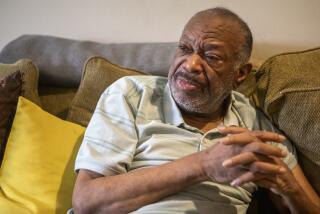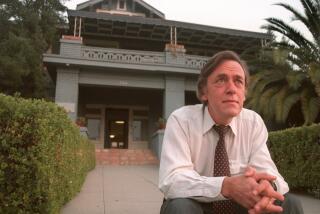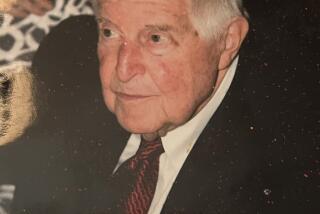David Cohen dies at 79; former president of advocacy group Common Cause
David Cohen, a former president of the advocacy organization Common Cause, who for more than four decades campaigned for greater government transparency and accountability as a leader in the corps of activists known as public-interest lobbyists, died Nov. 29 at his son’s home in Westport, Conn. He was 79.
The cause was a heart attack, said his son, Aaron.
“I have never heard a parent say, ‘I want my child to be a lobbyist,’” Cohen once quipped, reflecting on the dim view commonly held of Washington insiders who use their savvy or clout to push their clients’ interests among policymakers.
But Cohen saw himself and his colleagues not as representatives of special interests — as lobbyists for particular industries or groups are frequently described — but rather as advocates for what he thought to be the common good.
He joined Common Cause in 1971, a year after the nonpartisan organization was founded by John W. Gardner, a Republican who served as secretary of health, education and welfare in the Democratic administration of Lyndon B. Johnson. Mr. Cohen served as president of the organization from 1975 to 1981.
A self-described “people’s lobby,” the group began with 4,000 members who paid $15 in annual dues and voted on policy positions. Today it has more than 400,000 members and supporters, according to its website.
David Broder, the late Washington Post political columnist, noted in a 1977 column that despite its billing, the group was a “highly unrepresentative organization of mostly comfortably fixed and well-educated folks.” He observed that its work was “redolent of an unacknowledged bias for middle-class activism over any other form of political participation.”
But, Broder wrote in the same column, Common Cause “has had more impact on changing — and opening up — our political system than any other group in America in recent years.”
With Cohen’s participation or leadership, the group was credited with helping to marshal opposition to the Vietnam War, break down the seniority system in Congress that had consolidated power among entrenched committee chairmen, and enact ethics, conflict-of-interest and open-government legislation after the Watergate scandal.
Cohen was succeeded at Common Cause by Fred Wertheimer, now founder and president of the nonprofit, nonpartisan organization Democracy 21.
“David was an idealist with strong beliefs in advancing social justice, promoting peace and protecting the integrity of our democracy,” Wertheimer wrote in an e-mail. “He also understood the need for pragmatism in winning battles in Congress. David never abandoned his fundamental beliefs, but he also always worked to achieve the agreements that needed to be reached to advance the causes in which he believed.”
Mr. Cohen remained a prominent figure in Washington advocacy for years after he left Common Cause. In the mid-1980s, he and Michael Pertschuk, a former chairman of the Federal Trade Commission, founded the Advocacy Institute. That organization trained public-interest lobbyists domestically and internationally in how to effectively pursue their causes — “how to work the system,” Cohen told the New York Times, “how to bend it.”
(A sign, rescued from a magic store and placed in the office in jest, read, “Washington’s Headquarters for Magic, Tricks, Jokes — Fireworks.”)
Also in the 1980s, Cohen was president of the Professionals’ Coalition for Nuclear Arms Control, an umbrella group that included Physicians for Social Responsibility and that advocated nuclear disarmament. He served on the advisory council of J Street, a self-described group of “pro-Israel, pro-peace Americans” who support a two-state solution to the Israeli-Palestinian conflict.
He also was a senior congressional fellow at the Council for a Livable World, a foreign policy advocacy group, and worked behind the scenes to help gather support on Capitol Hill for the recent Iran nuclear deal, according to journalist Elizabeth Drew, a longtime friend.
“He really understood very well how you form coalitions,” she said in an interview. “He had kind of X-ray vision of the city.”
David Pesach Cohen was born in Philadelphia on Oct. 10, 1936. His father came to the United States from England, and his mother was from Eastern Europe.
He was a 1958 history graduate of Temple University. His first job was with an upholsterers’ union. In the early 1960s, he became legislative representative of Americans for Democratic Action, a left-leaning activist group in Washington. In his early work with Common Cause, he was director of field operations.
With his wife, Carla, Cohen was a part owner of Politics & Prose, the independent bookstore in Washington that she operated for nearly three decades with Barbara Meade and that became a gathering place for literary events.
Carla Cohen died in 2010 after 52 years of marriage. Besides their son, survivors include a daughter, Eve Cohen of San Francisco; and two grandchildren.
Two years ago, in an interview with the publication Pacific Standard, Cohen acknowledged the pitfalls of lobbying and said that he didn’t “expect or want the image of lobbying to change until we find and agree to separate the corrupting influences of money on our political and policy system.”
But he also drew attention to the profession’s importance.
“We all know the cartoon character of the fat guy with a big cigar passing out oodles of money. That’s not the full story or anything close to it,” he said. “Lobbying is about representing people’s interests as they work to redress their public grievances. We all have special interests, and they should not be dismissed or castigated.”
More to Read
Start your day right
Sign up for Essential California for the L.A. Times biggest news, features and recommendations in your inbox six days a week.
You may occasionally receive promotional content from the Los Angeles Times.






